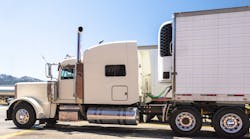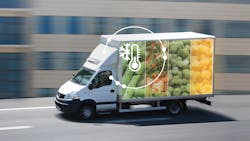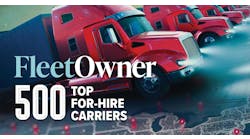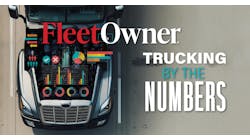This is an exciting time for cold-chain technology as numerous hardware, telematics, and vehicle advancements are revolutionizing how perishable cargo is hauled all over North America, providing refrigerated fleets with much to ponder as they attempt to keep up with the competition.
It’s a challenging time for the reefer community, as business conditions are perhaps trickier than ever. Long-term contract freight rates are stable, though volume is lower, but a lot of smaller refrigerated haulers have to use the spot market, which along with rising fuel prices, isn’t helping.
Spot refrigerated rates are running about 7% below the same period in 2022 and are more than 5% below their five-year average, according to Spot Market Insights from FTR Transportation Intelligence and load board Truckstop. For a recent period after Sept. 2, reefer rates on the spot market were the highest compared to dry van and flatbed, but they weren’t gaining much traction, rising only 2 cents, according to industry data aggregator DAT Freight & Analytics.
Despite these challenges, refrigerated fleets enjoy a relatively insulated segment of the trucking industry compared to the dry van segment, which is undergoing a lot of change with fleets such as Yellow Corp. folding and smaller fleets and owner-operators losing or abandoning their Federal Motor Carrier Safety Administration operating authorities, and flatbed freight transportation.
So, what can cold-chain carriers look forward to regarding technology, equipment advances in transport refrigeration units and auxiliary power units, and updates to refrigerated trailers themselves? FleetOwner has broken the latest down into four categories: Technology, TRU/APU Updates, Refrigerated Trailer Advancements, and Cold Storage. Many have to do with stricter emissions regulations, especially in California. These updates are compiled from reporting done by affiliate publication Refrigerated Transporter.
Technology
Webfleet intros cold-chain telematics
Webfleet, Bridgestone’s fleet management solution, introduced Webfleet Cold Chain, a real-time, single-platform monitoring solution that helps temperature-controlled fleets maintain cargo quality and safety, critical to avoiding extra costs from damaged goods or compliance issues.
Refrigerated cargo must be transported under a specific temperature range. Unsteady temps can damage goods like medicines, foods, and electronics. Maintaining temperature consistency is also about public safety because faulty temperatures can give rise to foodborne illnesses, Webfleet said. Delivering goods at incorrect temps can also lead to rejected loads as well as financial and reputational losses for a cold transport company.
With Webfleet Cold Chain, fleet managers can monitor, control, and record temperature conditions across refrigerated assets in real time. As a result, fleet operators and drivers can react quickly to adverse temperature events and reduce the risk of spoiled goods. Real-time insights enable drivers to provide proof of temperature consistency upon delivery
Orbcomm advances its RT8000 cold-chain telematics device
Orbcomm’s new RT 8000 cold-chain telematics device, expected to be available this summer but only in Europe initially, will help fleets enhance connectivity, access data faster, and digitize decision-making with wireless sensors.
Automated operations will provide more visibility, compliance, and cargo integrity for all types of refrigerated vehicles, the company said.
The RT 8000 will enable comprehensive temperature monitoring, fuel management, preventive maintenance, and remote control for operators in the food distribution, retail logistics, and pharmaceutical industries. Shippers and carriers can make informed decisions about their refrigerated business in real time by leveraging access to real-time and historical data and event-based alerts.
The solution’s multiple new interfaces will make it easy for customers to support any visibility, usage, productivity, security, or EBS/TMPS application for optimal versatility. Wireless sensor support for temperature and door, and the integration of Tractor ID for automated tractor/ trailer pairing, will facilitate easy installation, enabling fleets to upgrade their cold chain management with additional functionality, according to Orbcomm.
TRU/APU updates
Carrier adds new Vector trailer refrigeration units
Carrier Transicold now offers two premium-performance versions of its Vector trailer refrigeration system, designed to deliver high efficiencies and reduced emissions.“The new Vector 8700 single-temperature unit and Vector 8800MT multi-temperature unit build upon the legacy of E-Drive, the all-electric refrigeration technology pioneered and refined by Carrier Transicold, and used by thousands of fleets worldwide,” said Bill Maddox, senior manager of product management for Truck Trailer Americas at Carrier Transicold.
The new units feature an advanced version of the smart engine used throughout Carrier Transicold’s existing trailer platforms. Benefits include:
- Enhanced compliance: Under current regulations, the new Vector units provide lifetime compliance with the California Air Resources Board’s (CARB) stricter emissions rules for trailer refrigeration systems.
- Significantly better fuel economy: The advanced engine used in both units features common-rail fuel injection for optimized fuel delivery that reduces consumption by 5% to 10%.
- Greater sustainability: The units use R-452A refrigerant with a global warming potential 45% lower than the traditional transport refrigeration unit refrigerant, R-404A.
New solar charging options
Carrier Transicold also recently enhanced its platform of solar charging systems for transport TRU batteries with a broader array of choices and greater power delivery for faster charging.
“Rapid gains in solar panel technology have enabled us to make significant improvements to our solar charging systems, making this a great time to take advantage of our technology,” said Jason Forman, Carrier Transicold’s director of aftermarket parts sales and marketing.
The company’s current solar charging system platform for trailer and intermodal units includes:
- TRU-mount solar charging system: This design provides a custom fit on the narrow, curved top surface of Carrier Transicold trailer refrigeration units. This system now delivers 2.25 amps of power, a 12.5% boost over the original model.
- 50-watt trailer rooftop-mount system: This system now provides 4.2 amps of power delivery, about 2.5 times greater than Carrier Transicold’s original rooftop system.
- Charging system for Solara heating unit: This is the newest system designed for a Carrier Transicold unit. The 2.25-amp top-mount system is the first for the Solara unit, which heats trailers in cold climates.
Supra eCool reefers to debut
Carrier Transicold plans to introduce two single-temperature, electric truck refrigeration units as part of its new Supra eCool series aimed at helping California fleets meet looming zero-emission deadlines.
The Supra eCool electric units will cover 14- to 28-ft. Class 5 to Class 7 straight trucks and are designed for fleets seeking regulatory compliance or simply cleaner, more sustainable options, the company said. The engineless Supra e9 and e11 units will provide comparable refrigeration performance to Carrier Transicold’s diesel-powered Supra S8 and S10 units.
The new units “can take power directly from battery-electric vehicles (BEVs) or, when used with conventional engine-driven trucks, the units can run autonomously using their own power pack,” Maddox said.
According to the manufacturer, Supra eCool units feature:
- Efficient zero-emissions performance: Utilizing a direct-current electric power source, the unit eliminates fuel consumption, emissions, and noise associated with engine-driven systems.
- More environmentally sustainable refrigerant: The unit uses R-452A, a refrigerant with a global warming potential (GWP) 45% lower than the traditional refrigerant used in transport applications.
- Lynx Fleet telematics: Carrier Transicold’s telematics solution is factory-installed for remote monitoring of temperatures, location, movement, battery state of charge, and system operating performance. A service plan is required, however.
Engineless TRUs from Carrier Transicold
Carrier Transicold’s new engineless 40XR and 50XR truck refrigeration units are designed to elevate the efficiency, reliability, and sustainability of its direct-drive systems used for local and regional deliveries by grocery, food service, produce, and pharmaceutical businesses.
Along with contemporary aesthetics, the new XR series units provide improved air management and increased air flow, the company said, resulting in faster pulldown and more uniform temperature control than the X series models they succeed.
“The R in XR represents refinements we’ve made inside and outside to deliver greater performance and reliability,” said Scott Parker, Carrier Transicold truck products manager.
XR series units are designed for midsize and large trucks, Carrier added. The 40XR, with an on-road capacity of 14,500 BTU/hour, is designed for boxes 12 ft. to 18 ft. long. With a 17,000 BTU/hour on-road capacity, the model 50XR is well-suited to trucks with a cargo area up to 20 ft. in length.
Third-generation TriPac APU introduced
Thermo King recently introduced its third-generation diesel TriPac auxiliary power unit.
Building on the success of the TriPac Evolution, the new model provides the same comfort and performance customers expect but with added enhancements that reduce emissions, monitor unit performance, and increase profitability, according to Thermo King.
The third-gen TriPac APU is available now in two different models. One model is a 49-state Environmental Protection Agency (EPA) Tier 4 compliant solution for aftermarket installations. The second model includes a new aftertreatment device that is 50-state compliant with CARB and meets EPA Tier 4 compliance for new OEM or aftermarket installations.
The TriPac APU provides added value to customers with ESG targets because it eliminates unnecessary engine idling, which helps lower fuel consumption, Thermo King said. The TriPac consumes about 75% less fuel per hour, which equates to 2,500 gallons each year or 10,000 gallons over the typical length of tractor ownership.
The next-gen TriPac APU is the first in refrigerated transportation to include telematics capabilities for an APU, with TracKing telematics available on both new models. Adding telematics provides the data needed for a clear line of sight to the unit’s run hours, cabin temperatures, and fuel tax reporting. Real-time software updates, alarms, and maintenance reminders help ensure the APU runs smoothly.
Refrigerated trailer advancements
Schmitz Cargobull reefer snares sustainability award
Trailer manufacturer Schmitz Cargobull received a sustainability award from the German Institute for Service Quality for its energy-efficient, all-electric S.KOe Cool semi-trailer refrigerated box.
The trailer secured the top honor in the Technology-Energy category.
Marnix Lannoije, director of research and development at Schmitz Cargobull, accepted the prize at the official award ceremony in Berlin. “Schmitz Cargobull has been investing in research and development for sustainable and energy-efficient transport solutions for many years,” Lannoije said.
The all-electric S.KOe Cool semi-trailer is equipped with a purely electric refrigeration unit with integrated power electronics and a high-voltage battery system, as well as an axle generator, allowing it to operate emission-free. The electric vehicle is also quiet, enabling deliveries in urban areas in the early morning and late evening. The batteries on the landing gear replace the diesel tank and offer the option of installing an additional pallet box with space for 36 pallets. The company said the payload of the all-electric reefer box with high-voltage battery and e-axle is roughly the same as that of a refrigerated trailer with a diesel unit.
The elimination of the generator almost completely compensates for the additional weight of the battery on the all-electric refrigerated trailer.
The electric Schmitz Cargobull trailer axle recuperates energy during braking, extending the refrigeration unit's operating time or reducing the battery's recharging times via the power grid. In practical use in delivery traffic, fuel savings of 5% were achieved in combination with a diesel-powered tractor. The system is fully integrated into the Schmitz Cargobull telematics.
Two firms unveil zero-emission refrigerated rig
Penske Logistics has become the first third-party logistics provider to pair an nMotion TR 160-45-equipped reefer trailer with a Freightliner eCascadia electric semi-truck.
The pairing enables zero-emission refrigerated transport by combining an all-electric tractor with a reefer trailer cooled by an electric standby TRU powered by energy generated from in-wheel electric motors. Leveraging this in-wheel PreSet Plus eHub technology, the nMotion system generates power for the reefer whenever the vehicle is in motion to keep valuable cargo cold mile after mile.
“The pilot has been performing well, and our customer is excited about conducting direct store zero-emissions tailpipe deliveries on a daily basis,” said Jeff Jackson, executive VP of dedicated contract carriage at Penske Logistics.
In conjunction with ConMet eMobility, Penske Logistics first deployed this advanced solution on a quick-service retail delivery route in Southern California in February. Covering more than 160 miles each trip with eight delivery stops, the reefer has consistently achieved 100% electric TRU run time. Since first deployed, the fleet has completed more than 125 trips, covering over 20,000 miles and 2,500 TRU run hours while maintaining cold cargo temperature and on-time deliveries.
Cold storage
Cold-chain startup set to ‘revolutionize’ industry
Startup cold storage developer and operator Envision Cold launched its cold-chain platform with a $500 million investment from an undisclosed capital partner that will allow Envision to acquire and develop over $1.5 billion of cold storage assets.
The firm, founded last year in Atlanta, provides complete services along the full scope of cold chain, including transportation, import and export services, and real estate development. Envision engaged a real estate development team to oversee all ground-up development projects, which will be essential to its growth, Envision reported.
“The magnitude of this investment was driven by the strength of not only our team’s commitment to innovation and service but also to the opportunity within the market itself,” Envision CEO Austin Solem said.
Since the company’s inception, Envision has closed on acquiring cold storage operations and assets in Oakland and San Francisco, California; Laredo, Texas; and Vancouver, British Columbia, Canada. The company plans to continue acquiring and developing a network of facilities across North America.
SnoFox emerges with $4.5M in seed funding
SnoFox Sciences, a business intelligence company that provides data analytics software for the global cold chain, recently raised an additional $4.5 million in seed funding led by Voyager Ventures, bringing its total investment to $5.7 million.
The round included participation from Pale Blue Dot, Ponderosa Ventures, and Mudcake.
The Philadelphia-based firm reports it plans to use the funds to reach new customers in more markets across the U.S., as well as hire new talent, as demand for energy efficiency grows within the cold chain.
“Every consumer in America relies on the cold supply chain, whether they realize it or not,” said Ben Rubin, CEO and co-founder of SnoFox. “From food to vaccines, so many valuable resources are wasted due to energy inefficiency. By optimizing the energy consumption within the cold chain, we can significantly reduce waste, ensuring that precious resources are utilized efficiently and sustainably.”
SnoFox plans to soon have 10 facilities across seven U.S. states pioneering its technology for advanced machine learning and business intelligence in their warehouses.





